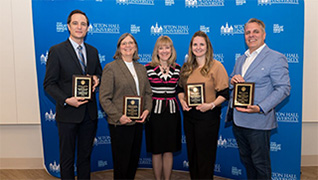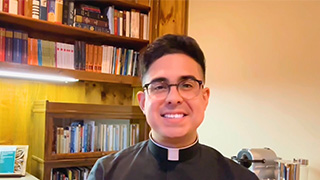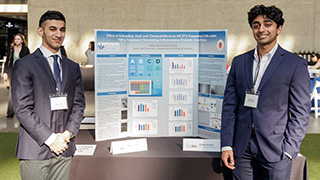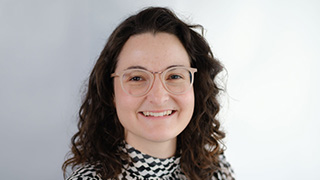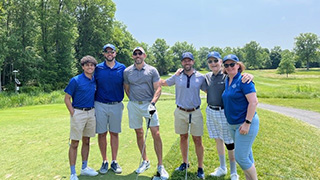Inside the Core: Core Fellow Roger Alfani, Ph.D., Travels to Africa with NEH Grant
Tuesday, June 13, 2023
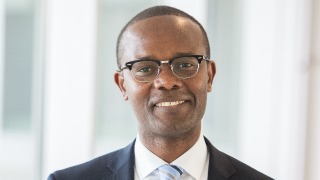
Roger Alfani, Ph.D., Seton Hall University Core Fellow
Inside the Core, we are very excited that one of our Core Fellows, Roger Alfani, Ph.D., will be traveling to Africa this week as part of the work he is doing with colleague Nicole Eggers, Ph.D., of the University of Tennessee in Knoxville, both recipients of The National Endowment for the Humanities (NEH) Grant. As is commonly known, NEH Grants are very competitive and prestigious, and both Eggers and Alfani are very proud and grateful to have received it. The funds, totaling USD $199,611 will finance their travels as they conduct research among Congolese refugees in settlement camps in Africa and in their resettlement in the US with a focus on the role religion plays in helping displaced persons cope and even surmount their troubles.
Alfani explains the underlying background for the project in some detail:
The question of how people in contexts of upheaval and displacement cope with their experiences of trauma and loss is one of enduring significance to the humanities. It matters not just because of its implications for international humanitarian policy, but because attention to the historically and culturally situated experiences of displaced people helps us to see them not just as "victims" or a "problem" that needs solving, but as creative agents and producers of knowledge in their own right. Over the past two decades, conflicts and political instability in the Democratic Republic of Congo (DRC) have rendered it one of the world's most significant producers of international refugees. And while there has been some research done on their experiences, it has largely focused on a) the political context of their flight, and b) the capacity of development organizations and institutions to manage and deliver services to them. Meanwhile, very little has been written about the role that religion and spirituality play in their lived experiences of flight and resettlement. Such an oversight results in a very narrow understanding of the refugee experience, ignoring a central component of how they imagine and seek to affect the trajectory of their own lives.
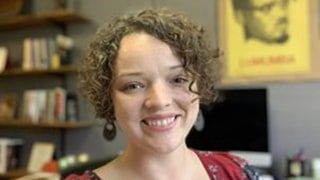
Nicole Eggers, Ph.D., University of Tennessee
In their research, Alfani and Eggers seek, as he describes it, "to illuminate how religion functions both as a space for building community for people who have lost their social safety net, as well as its role in addressing gaps — material, social, psychological, and spiritual — that state and international organizations too often neglect. Central to our investigation will be the question of how people connect their experiences of social and physical security and insecurity to their understandings of spiritual security and insecurity." These questions are central to the Core because they get to the heart of the role of faith in what has become a humanitarian crisis; the Signature classes (Core I, II, and III) all engage with how faith enables real people to live and to find meaning in the many challenges of today’s world, thus linking the Core closely with Alfani's and Eggers' research project.
Alfani explains, "The project will investigate the significance of religion at different junctures of the Congolese refugee experience. Our interview phases began last year with a set of visits in Knoxville/Tennessee (US) and will continue this summer in Africa where will be conducting additional interviews among those still living in refugee camps in Burundi, Uganda, and Kenya, as well as among those who have left the camps — either to be repatriated to Congo, or to be resettled in the United States." Dr. Alfani himself is from the Democratic Republic of Congo, having moved to Canada with his family where he received his doctorate in Religious Studies and Peacebuilding from University of Montreal, Montreal, Quebec, Canada, from which he also received an M.A. in Biblical studies and Theology. He also holds an M.S. from Seton Hall University's School of Diplomacy in International Affairs and Foreign Policy Analysis.
The scope of the research from this NEH grant will be broad as the two researchers will be focusing on a variety of religious communities, "mainstream, transnational, and internationally connected religious communities as well as smaller, non-denominational, and independent churches." As Alfani explains, "this multi-sited, multi-confessional approach will allow us to feature a diversity of refugee perspectives and offer a more comprehensive understanding of refugee experiences than can be found in existing studies. At the same time, our qualitative, ethnographic approach to the research will allow us to highlight the many contingencies of individual experience and consider how other aspects of refugee identity — such as gender, age, or ethnicity — intersect with religion."
The goal of the research in practical terms will be a co-authored monograph that will not only make a significant contribution to the fields of refugee studies and religious studies, but will also, as Alfani puts it, "constitute a rich archive of stories from refugee lives." In addition, if conditions permit recording with protections for the refugee human subjects, they hope to create a free digital humanities website that will make their research available to others interested in the topic. Alfani and Eggers will also present their research at the international conference of the ASA (African Studies Association) this coming November-December in San Francisco. Alfani will co-chair a panel entitled "Narrating Refuge: Towards an Understanding of Great Lakes Refugee Experiences."
Beyond these specific scholarly outcomes, moreover, the research will engage with "the promotion of human dignity," which "lies at the root of the Catholic intellectual tradition." As Alfani explains, "With more than 81 million forcibly displaced people in the planet, forced migration poses itself as one of the biggest threats and global challenges in the 21st century to fulfilling this call to promote human dignity." The Catholic Church, particularly Pope Francis, has sought to bring the world's attention to this issue. His first visit outside the Vatican as Pope was to Lampedusa, where refugees are housed after a dangerous journey to Italy by sea. The Church also works all over the world helping to alleviate some of the suffering of migrants. Therefore, this topic, while clearly scholarly in nature, goes beyond academics. As Alfani says, "It is equally a moral responsibility to engage with this issue at a faith level constructively and practically. In other words, faith and reason (state and non-state actors) do not (and should not) oppose each other when it comes to examining issues pertaining to forced displacement or concerning refugees; rather they are complementary, especially from the lenses of the displaced/refugees who are in a vulnerable position." This intersection of faith and reason, of intellectual pursuits and their application in the lived experience of real people, is exactly what the Core is all about.
Beyond the application of the research to the Core generally, students will be very lucky to have this coming Fall a course that tackle issues of forced migration taught by Dr. Alfani and called “Refugees, Religion, and Refugees," which will not only draw from different disciplines (e.g., international relations, peace studies, religious studies, sociology, and theology), but it will also offer students an opportunity for experiential learning. That is, the nature of the course itself is to connect, reflect on, and apply theoretical knowledge to real world problems. Another aspect of this course is its study abroad component (more details to come). The research accrued from this NEH project will undoubtedly richly enhance this Core III course. The Core celebrates this prestigious award and the important work it will allow for our newest Core Fellow.
Categories: Faith and Service, Research

